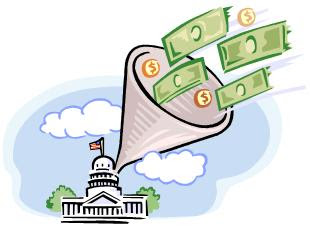Read any article about 401k's (or any other government sponsored plan) and probably the main focus of the article will be how great the tax benenfits are for the individual. While not having to pay taxes on a pool of money is good, what is often overlooked is the access you give up on those funds (not to mention the complex rules you must follow should you ever need that money). Overlooked often are the downsides of giving up access on these funds can actually make someone poorer not richer (even with a company match!) at retirement. Below are 4 risks people face when locking money away in a qualified plan like a 401k:
1. Lost of capital means more finance charges. I've met many people who have two car payments, student loans, credit card debt, and a mortgage yet they are putting away as much as they can into their employer sponsered qualified 401k plan. People often overlook that if 35% of your income is going towards finance charges, it is very difficult to become financially independent when you are only saving 10% of your income. The other problem is this also results in more costs when unforeseen circumstances arrive. A recent survey stated that 71% of Americans would be financial trouble if their paycheck was delayed by just one week.
2. Hidden fees are also overlooked in 401k's. A recent expose on Bloomberg television stated that many midsize 401k plans they reviewed had fees in excess of 3.5 to 4%. The best run plans still had total fees in the 1.5% range. To give you an idea what this difference means for a 35 year old with $100,000 growing at 5% at age 65 with a 1.5% fee is the difference of $551,601 (no fees) versus $333,359 (with 1.5% fee) or nearly 40% less in retirement (it's more than half if you have fees around 2.5%!)
3. Something only recently realized are the risk inherent in most 401k's since most options are stock market related and typically have no type of insurance program to guarantee against a lost of money. If the market lost 50% or more like it did between 2008-2009 may not be a big deal if you are 35, but imagine it happened a year or two before your scheduled retirement date. This is something of a big concern right now to my parents generation. What's worse is hearing stories of these same folks about how they sacrificed for all these years only to have to sacrifice even longer. If you hear enough of these stories you too will grow tired of the cliche "you're in it for the long haul." What if the "long-haul" is longer than you left on this Earth?
4. The gorilla in the room that we never hear about as a future risk is "Taxes!" Most 401k plans rely on a tax postponement. This means you don't avoid taxes you simply are delaying paying taxes. Typically when people are younger they have a lot of deductions (kids, home interest, etc.) and typically are in the lowest tax brackets they'll be in their lifetime. When people are older the kids are gone, the home is paid for, and they have very few if any deductions. So most people then defer taxes while they are in a low tax bracket only to have to pay taxes when they are in a higher tax bracket on that same pool of money. This single risk can have a huge impact and I'd admit may turnout to be a bigger risk than the 3 above risks combined.
If you would like a copy of a special report on how you can help avoid or eliminate the above risks please please email me at:
Josh@jsmithfin.com
Joshua Smith
J. Smith Financial
Josh@jsmithfin.com
Have any questions/comments or topics you would like covered? Please feel free to email at the email address above.




